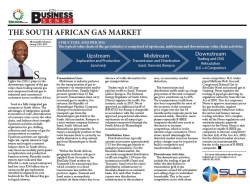Nkosinathi Solomon - Group CEO, SLG : The South African Gas Market2017-04-12 Spring Lights Gas (SLG ) plays in the downstream segment of the gas value chain trading natural gas and compressed natural gas to industrial and commercial customers across southern Africa.
Sasol is a fully integrated gas company in South Africa. The advantages of integration include economies of scale, diversification of economic rents across the value chain, and balance sheet strength. Upstream activities include exploration for gas, drilling, collection and recovery of gas for transportation to markets. Upstream activities are typically high risk, capital intensive, high return and require a massive balance sheet. In South Africa, only Sasol successfully participates in exploration and production business activity. Recently, media reports have indicated that PetroSA (a state owned enterprise) had lost circa R14 billion due to unsuccessful gas exploration intended to augment its own feedstock for the Mossel Bay gas to liquid refinery. Transmission Lines Midstream is industry parlance for the transportation of gas to customers via transmission and/or distribution lines. Usually higher-pressure (greater than 15 Bar pressure) transmission lines carry recovered gas to markets. For instance, the Republic of Mozambique Pipeline Company (Rompco) transmission line transports gas from the Mozambique’s gas fields to the South African market. Rompco is a joint venture company between Sasol, South African and Mozambican governments. It enjoys a monopoly position in that route because there is currently no viable alternative to ship natural gas from Mozambique to South Africa. Within the South African geography, methane rich gas is supplied from Secunda to the KwaZulu-Natal market via Transnet’s Lily transmission line, which connects to a Sasol transmission line within the province. Again, Transnet and Sasol enjoy a monopolistic position on these routes due to an absence of viable alternatives for gas transportation. Traders such as SLG pay pipeline tariffs to Sasol, Transnet and/or Rompco. The National Energy Regulator of South Africa (Nersa) regulates the tariffs. For instance, early in 2017, Nersa approved an additional tariff of R49.87/GJ for Rompco chargeable in accordance with the current approved proportional allocation mechanism on all natural gas volumes transported through the South Africa to Mozambique transmission line. Distribution Lines Distribution lines typically operate at pressures approximately 2-15 bar ferrying gas mainly to industrial consumers. For the KwaZulu-Natal market, the currently unregulated distribution tariffs are roughly 1.18 times the transmission tariffs (Sasol and Transnet). Sasol owns the entire distribution infrastructure in KwaZulu-Natal on an exclusive basis. SLG and other traders cannot own distribution infrastructure in the exclusive area, an anomalous market distortion. The transmission and distribution tariffs make up a huge proportion of the total consumer gas price sometimes up to 45%. The transportation tariffs have also been responsible for most of the increases in the consumer price of gas over the last 18 months as the molecule prices has remained stable. Therefore, more players especially B-BBEE companies should own assets in this sector to increase competition, which is in the interests of gas consumers. Nersa alone cannot disentangle the distorted market structure because policy changes may be required to build a competitive and transformed industry. Downstream Activities The downstream activities include the trading of gas off either the distribution or transmission grid to gas consumers or/and the reticulation and selling of gas to individual households. This is the most competitive sector with about seven competitors. SLG trades piped Methane Rich Gas and Compressed Natural Gas in KwaZulu-Natal and natural gas in Gauteng. Nersa regulates the trading of piped gas deriving its regulatory authority from the Gas Act of 2001. This Act empowers Nersa to approve maximum prices for gas molecules, regulate discriminatory behaviour within the sector and licence various trading activities. SLG complies with all the Nersa regulations and routinely submits quarterly reports to the Nersa. Nersa is also required to enable B-BBEE gas companies to become competitive (Section 2(d) of the Gas Act, 2001) but the distorted market structure remains an insurmountable barrier to the success of B-BBEE companies. For more information about the gas, industry go to www.slgas.co.za or call 031 812 0555. |
Nkosinathi Solomon - Group CEO, SLG : The South African Gas Market
Copyright © 2025 KwaZulu-Natal Top Business
